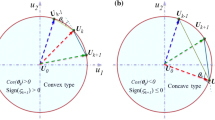Abstract
Performance measure approach (PMA) is a recently proposed method for evaluation of probabilistic constraints in reliability-based design optimization of structure. The advanced mean-value (AMV) method is well suitable for PMA due to its simplicity and efficiency. However, when the AMV iterative scheme is applied to search for the minimum performance target point for some nonlinear performance functions, the iterative sequences could fall into the periodic oscillation and even chaos. In the present paper, the phenomena of numerical instabilities of AMV iterative solutions are illustrated firstly. And the chaotic dynamics analysis on the iterative procedure of AMV method is performed. Then, the stability transformation method of chaos feedback control is suggested for the convergence control of AMV procedure in the parameter interval in which the iterative scheme fails. Numerical results of several nonlinear performance functions demonstrate that the control of periodic oscillation, bifurcation and chaos for AMV iterative procedure is achieved, and the stable convergence solutions are obtained.
Similar content being viewed by others
References
Cheng GD, Xu L, Jiang L (2006) A sequential approximate programming strategy for reliability-based optimization. Comput Struct 84(21):1353–1367
Chiralaksanakul A, Mahadevan S (2005) First-order approximation methods in reliability-based design optimization. ASME J Mech Des 127:851–857
Der Kiureghian A, Zhang Y, Li CC (1994) Inverse reliability problem. ASCE J Eng Mech 120(5):1154–1159
Du XP, Sudjianto A, Chen W (2004) An integrated framework for optimization under uncertainty using inverse reliability strategy. ASME J Mech Des 126(7):562–570
Kapitaniak T (1996) Controlling chaos: theoretical and practical methods in nonlinear dynamics. Academic, London
Kirjner-Neto C, Polak E, Kiureghian AD (1998) An outer approximations approach to reliability-based optimum design of structures. J Optim Theory Appl 98(1):1–16
Lee TW, Kwak BM (1987–1988) A reliability-based optimal design using advanced first order second moment method. Mechan Struct Mach 15(4):523–542
Lee JJ, Lee BC (2005) Efficient evaluation of probabilistic constraints using an envelope function. Eng Optim 37(2):185–200
Lee JO, Yang YS, Ruy WS (2002) A comparative study on reliability-index and target-performance-based probabilistic structural design optimization. Comput Struct 80:257–269
Li H, Foschi RO (1998) An inverse reliability method and its application. Struct Saf 20:257–270
MaCauley JL (1993) Chaos, dynamics and fractals. Cambridge University Press, Cambridge
Ott E, Grebogi C, Yorke JA (1990) Controlling chaos. Phys Rev Lett 64(11):1196–1199
Pingel D, Schmelcher P, Diakonos FK (2004) Stability transformation: a tool to solve nonlinear problems. Phys Rep 400:67–148
Robinson RC (2004) An introduction to dynamical system: continuous and discrete. Pearson Education, New York
Schmelcher P, Diakonos FK (1997) Detecting unstable periodic orbits of chaotic dynamical systems. Phys Rev Lett 78(25):4733–4736
Tu J, Choi KK, Young HP (1999) A new study on reliability-based design optimization. ASME J Mech Des 121(4):557–564
Wu YT, Millwater HR, Cruse TA (1990) Advanced probabilistic structural analysis method for implicit performance function. AIAA J 28(9):1663–1669
Yang DX (2007) Chaos control of FORM iterative algorithm in structural reliability analysis. Chin J Theor Appl Mech 39(5):647–654.
Yang RJ, Gu L (2004) Experience with approximate reliability-based optimization methods. Struct Multidisc Optim 26(2):152–159
Yang DX, Li G, Cheng GD (2006) Convergence analysis of first order reliability method using chaos theory. Comput Struct 84(8–9):563–571
Yi P, Cheng GD, Jiang L (2008) A sequential approximate programming strategy for performance-measure-based probabi listic structural design optimization. Struct Saf 30(2):91–109
Youn BD, Choi KK (2004) An investigation of nonlinearity of reliability-based design optimization approaches. ASME J Mech Des 126(5):403–411
Youn BD, Choi KK, Park YH (2003) Hybrid analysis method for reliability based design optimization. ASME J Mech Des 125(3):221–232
Youn BD, Choi KK, Du L (2005a) Adaptive probability analysis using an enhanced hybrid mean value method. Struct Multidisc Optim 29:134–148
Youn BD, Choi KK, Du L (2005b) Enriched performance measure approach for reliability-based design optimization. AIAA J 43(4):874–884
Zou T, Mahadevan S (2006) A direct decoupling approach for efficient reliability-based design optimization. Struct Multidisc Optim 31:190–200
Author information
Authors and Affiliations
Corresponding author
Rights and permissions
About this article
Cite this article
Yang, D., Yi, P. Chaos control of performance measure approach for evaluation of probabilistic constraints. Struct Multidisc Optim 38, 83–92 (2009). https://doi.org/10.1007/s00158-008-0270-3
Received:
Revised:
Accepted:
Published:
Issue Date:
DOI: https://doi.org/10.1007/s00158-008-0270-3




